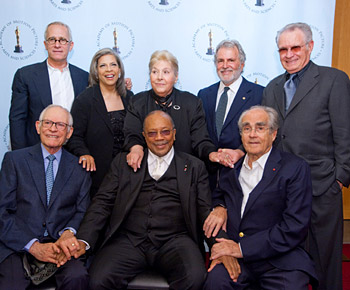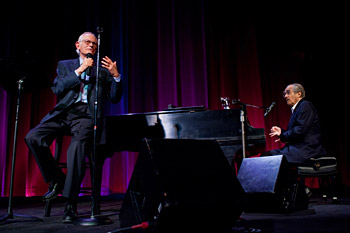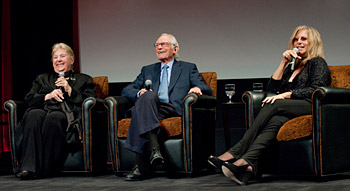

  |
|
|
||||||||||||||||||||||
|
FMS FEATURE... June 4, 2009 Motion Picture Academy Tribute to Alan and Marilyn Bergman Host Quincy Jones joined by Streisand, Legrand, Grusin and others by Jon Burlingame  From left to right: (seated) Alan Bergman, Quincy Jones, Michel Legrand; (standing) James Newton Howard, Patti Austin, Marilyn Bergman, Sid Ganis and Dave Grusin. The Bergmans are 16-time Oscar nominees, having won the coveted statue three times: for "The Windmills of Your Mind" from The Thomas Crown Affair (1968), the title song from The Way We Were (1973) and for the original song score of Yentl (1983). The two-and-a-half-hour event consisted of film clips, live musical performances and on-stage conversation with musical collaborators and the Bergmans themselves. Academy President Sid Ganis introduced the evening; Jones, who worked with the Bergmans on In the Heat of the Night (1968), served as a very informal host. "I can't imagine what my life would have been without you," Jones told the Bergmans from the stage, adding to the crowd that their legacy is not only their work but also "their integrity and profound humanity." Clips screened included the main title sequences, featuring the title songs, of The Way We Were and In the Heat of the Night and "The Last Time I Felt Like This" from Same Time, Next Year (1978). Marvin Hamlisch, who wrote the music for The Way We Were and Same Time, Next Year, sent a video greeting that described their collaborations as pure "joy." Other songs heard in film clips included "I Believe In Love" from A Star Is Born (1976, music by Kenny Loggins), "How Do You Keep the Music Playing?" from Best Friends (1982, music by Legrand) and "It Might Be You" from Tootsie (1982, music by Grusin). Singer Patti Austin sang "How Do You Keep the Music Playing," "The Girl Who Used to Be Me" from Shirley Valentine (1989, music by Hamlisch) and "What Matters Most" from The Champ (1979), the last with composer Grusin at the piano. Grusin spoke fondly of Tootsie director Sydney Pollack as one of few directors who "actually left space in the middle of a movie for a song," and the Bergmans as co-writers who would "go anywhere you want to go musically." Howard – whose work with them includes "Places That Belong to You" from The Prince of Tides – added that, with the Bergmans, "you don't see the technique... their lyrics are direct, honest... it just seems effortless." John Williams sent a video greeting that described the Bergmans as "on anyone's list of the greatest lyricists of all time." Norman Jewison sent one too, reminiscing about working with them on In the Heat of the Night, Thomas Crown Affair, Gaily, Gaily (with Henry Mancini), ...And Justice for All (with Grusin) and Best Friends. Michel Legrand flew in from Paris for the event, playing the piano and singing "I Was Born in Love With You" from Wuthering Heights (1970). The evening's highlight for many, however, was the stunning duet of Legrand and Alan Bergman on one of their most famous songs, "The Windmills of Your Mind" from The Thomas Crown Affair that also included footage of Steve McQueen's glider sequence that inspired it.  Alan Bergman and Michel Legrand perform "The Windmills of Your Mind." Bergman talked about how fortunate they had been "to write with these marvelous composers" and added that "there are words on the tips of these notes, and we have to find them." He told the story of how he proposed to Marilyn with the song "That Face," which he convinced Fred Astaire to sing on a demo; footage of the song, as later used in Paris When it Sizzles (1964) with Audrey Hepburn and William Holden, was shown. Jones brought both Marilyn and Alan Bergman to the stage to discuss their work. Marilyn talked about the complexity of their assignment on The Happy Ending (1970), where director Richard Brooks had asked for a single song to be played twice – first as a young couple was falling in love, then 15 years later as their marriage has dissolved. Clips of both scenes were shown with the now-famous, Oscar-nominated tune "What Are You Doing the Rest of Your Life?" Alan Bergman recalled that, when they gave composer Legrand their tentative title, he immediately went to the piano and improvised a melody, asking, "You mean something like that?" Luckily they were recording the session, and the tune – which Legrand said he probably couldn't repeat – was preserved on tape.  Marilyn Bergman, Alan Bergman and Barbra Streisand share stories about Yentl. Streisand announced that she would soon record an all-Bergman-song album. ©2009 Jon Burlingame |
Search
Past Features
|